 Conqueror of Hearts table of contents Conqueror of Hearts table of contents
Photographs of A. Q. Faizi
click on any photo for a full-size version
(size and quality vary)
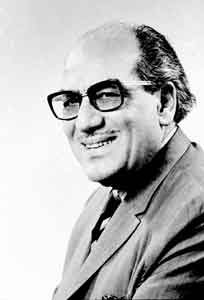
Mr. Faizí
photo provided by Duane Troxel |
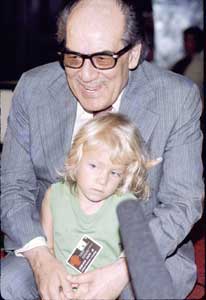
Mr. Faizí and young friend
photo provided by Bob Harris |
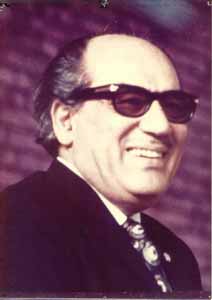
Mr. Faizí
click here for print-size image
photo provided by Shirley Macias |
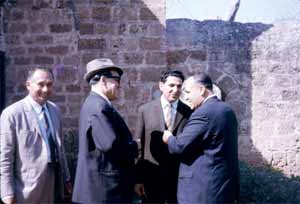
Left to right: Unknown, Mr. Faizi, Mr. Fatheazam, Dr. Muhajir
photo provided by Duane Troxel |
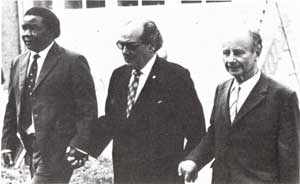
Hands of the Cause (left to right) Enoch Olinga, Abu'l-Qasim Faizi and Dr. Adelbert Mühlschlegel,
Teaching Conference, Plön, Germany; 1972.
photo scanned from Bahá'í World vol. 18, p. 504 |
Biography of Abu'l Qásim Faizí
prepared by the Bahá'í World Center
Abu'l Qásim Faizí was born in the city of Qúm,
Irán, 1909 [sic — other sources give 1906. -J.W.]. This town is famous for its theological institutions, the
best known being the "Faizí School of Theology" where thousands study
and live expecting to be great religious leaders in Iran. His maternal uncle
was the head of this institution and well known throughout Persia and Iraq as
one of the few leaders of the Shi'ih sect of Islám.
At the age of eight or nine he left his birthplace for Tihrán. As he
went to Tarbíyat School (a Bahá'í School) for his
elernentary education. He went to the classes on the Bahá'í
Faith as well, and gradually became an adherent of the Faith.
When he was 19 years old, he went to the American University of Beirut.
Because of its closeness to Haifa, Mr. Faizí had the honor of meeting
Shoghi Effendi, the Guardian of the Bahá'í Faith, several times.
During these visits he heard from the Guardian that youths' ideal in life
should be the consecration of their lives for the service of the
Bahá'í Cause; that is to say, to spread the healing message of
Bahá'u'lláh, God's latest Messenger - the Message of Love,
Justice, the Oneness of Mankind. Mr. Faizí determined to follow this
guidance and after graduation from the University, with a degree in English
Literature and Education, he went to Persia. Here he spent five years in a
village educating 600 Bahá'í children who had no means of
education. He went to Qazvín where more than 30 youth were trained in
one year to be scattered throughout the world as Bahá'í pioneers
and teachers. Following this, he spent one year in Baghdád where
he helped the Bahá'í National Spiritual Assembly of Iraq and the
pioneers. Fifteen years were spent in Arabia where he lived as a pioneer
himself.
In 1957 he was designated by the Guardian of the Bahá'í Faith a
"Hand of the Cause of God"-- an appointment of honor and
responsibility. Since the passing of the Head of the Faith, Mr. Faizí
has lived in Haifa, as one of the "Hands of the Cause residing in the Holy
Land."
By profession he is a writer, earning his living by writing novels, short
stories and drama, as well as translating books and teaching languages.
Examples of some of his writing, with which the English-speaking friends are
familiar, are:
- Flame of Fire, The Prince of Martyrs, From Adrianople to `Akká
- Stories from the Delight of Hearts, an abridged translation of The
Memoirs of Hájí
- Mírzá Haydar-`Alí (Kalimat Press, 1980)
- Meditations on the Eve of November 4th
- Explanations of the Symbol of the Greatest Name
Some of his original
works in Persian are Zamana--Collection of Essays, and
Zonnar--Collection of Short Stories.
Excerpts from the Memorial Service For Hand of the Cause Abu'l-Qásim Faizí (1906-1980)
December 21, 1980 - Hawaiian National Bahá'í Center
Program:
Opening prayer - Bahá'í Prayers, #12
Reading of cable from The Universal House of Justice.
Introduction: The Institution of the Hands of the Cause of God
Eulogy for Hand of the Cause of God Abu'l-Qásim Faizí
Poem "In Memoriam" by Roger White
Prayer for the Hands of the Cause of God
Reading from Gleanings, pp. 155-157
Reading from Gleanings, pp. 140-141
Prayer for the Departed - Bahá'í Prayers, #14
Opening Prayer
Glory be to Thee, O Lord my God! Abase not him whom Thou hast
exalted through the power of Thine everlasting sovereignty, and remove not far
from Thee him whom Thou hast caused to enter the tabernacle of Thine eternity.
Wilt Thou cast away, O my God, him whom Thou hast overshadowed with Thy
Lordship, and wilt Thou turn away from Thee, O my Desire, him to whom Thou hast
been a refuge? Canst Thou degrade him whom Thou hast uplifted, or forget him
whom Thou didst enable to remember Thee?
Glorified, immensely glorified art Thou! Thou art He Who from
everlasting hath been the King of the entire creation and its Prime Mover, and
Thou wilt to everlasting remain the Lord of all created things and their
Ordainer. Glorified art Thou, O my God! If Thou ceasest to be merciful unto
Thy servants, who, then, will show mercy unto them; and if Thou refusest to
succor Thy loved ones, who is there that can succor them?
Glorified, immeasurably glorified art Thou! Thou art adored in Thy truth,
and Thee do we all, verily, worship; and Thou art manifest in Thy justice, and
to Thee do we all, verily, bear witness. Thou art, in truth, beloved in Thy
grace. No God is there but Thee, the Help in Peril, the Self-Subsisting
Bahá'u'lláh, Prayers and Meditations, pp.
261-262)
Cable from The Universal House of Justice
Hearts filled with sorrow passing indefatigable self-sacrificing dearly-loved
Hand cause of God Abu'l-Qasim Faizi. Entire Bahá'í World mourns his loss. His
early outstanding achievements in cradle Faith through education children and
youth, stimulation friends promotion teaching work, prompted beloved Guardian
describe him as "luminous, distinguished, active youth." His subsequent
pioneer work in lands bordering Iran won him appellation spiritual conqueror
those lands. Following his appointment Hand Cause he played invaluable part
work Hands Holy Land, travelled widely, penned his literary work, continued his
extensive inspiring correspondence with high and low, young and old, until
after long illness his soul was released and winged its flight Abha Kingdom.
Call on friends everywhere hold befitting memorial gatherings his honor
including special commemorative meetings his name in Houses of Worship all
continents. May his shining example consecration continue inspire his admirers
every land. Praying Holy Shrines his noble radiant soul may be immersed in
ocean divine mercy continue its uninterrupted progress in infinite worlds
beyond.
Eulogy (presented by Duane Troxel)
Abu'l-Qásim Faizí was elevated to rank as a Hand of the Cause of
God in the last contingent appointed by the Guardian in October 1957. Shoghi
Effendi said these eight Hands were "chosen from the four continents of the
globe" and represented "the Afnán, as well as the black and white races
whose members" were "derived from Christian, Muslim, Jewish and Pagan
backgrounds."
Mr. Faizí was raised a Muslim. In his youth he entered a school for
Islamic studies. Not long after this he heard of the Cause, investigated it,
and embraced it with a deep love and devotion that grew with each passing
year.
He was one of the early teachers in the Tarbiat Bahá'í School,
renowned for its distinguished graduates. As early as 1933, when Mr.
Faizí was only twenty-seven, the Guardian chose him to be his
representative at the memorial service for the first American martyr, Keith
Ransom-Kehler.
At the time of his appointment as Hand, Mr. Faizí was a pioneer in the
Arabian Peninsula, and chairman of its Regional Assembly. Just a month later
the beloved Guardian was summoned to the Abhá Paradise. Mr.
Faizí hurried to London where he joined his fellow Hands in planning the
funeral program.
Hand of the Cause, Dr. Ugo Giachery, recounted Mr. Faizí's recitation
of the Prayer for the Dead with these words: "...the chant of
Abu'l-Qásim Faizí, steady, but interwoven with deep emotion, is
in the air. It is the Prayer for the Dead of Bahá'u'lláh. It
becomes our cry, our imploring. I cannot stand it, my heart is pounding to the
breaking point. Will God have mercy on us?"
Later, twenty-six Hands gathered at the Mansion of Bahjí to appoint
nine of their number to serve in the Holy Land as Custodians of the Faith. Mr.
Faizí became one of those nine. In 1963, following the election of the
Universal House of Justice, the Hands cabled the Bahá'í World
that five Hands would work at the World Centre to facilitate the international
work of the Institution of the Hands and to assist the Universal House of
Justice. Abu'l-Qásim Faizí was chosen one of those five.
Mr. Faizí left the Holy Land only infrequently after his appointment.
Usually he traveled out to attend conferences or to represent the House of
Justice at the formation of new National Assemblies.
In 1960 he visited Europe for a few months. His longest stay was in Latin
America from 1962 to 1963. Between 1963 and 1968 he made several extensive
teaching trips, visiting centers in Europe, Asia, the Philippines, Taiwan,
Korea, Japan, Hawaii and mainland U.S.A.
In 1970 he was the representative of the Universal House of Justice at the
formation of the National Spiritual Assemblies of Central Africa and Zaire. In
the 70s he began a series of long teaching journeys to Europe, Latin America
and North America. These included the St. Louis and Hilo conferences in 1974,
and Turkey, where he represented the House of Justice for the formation of the
National Spiritual Assembly of Turkey.
Most of us know Mr. Faizí from our pilgrimages or through his writings.
One Hawaii believer recalls that the most difficult questions asked by the
pilgrims were invariably met with the response, "Ask Mr. Faizí, he can
answer that."
Mr. Faizí was a master of Arabic and Persian and used his talents in
translation of Bahá'í books. Among the works he translated into
Persian are Portals to Freedom and The Priceless Pearl. And from
Persian into English he translated Delight of Hearts, the life of
Mírzá Haydar-`Alí.
He was a gifted storyteller and published many stories in Persian and Arabic.
His publications in English are too many to enumerate here, but quotations from
two of them will reveal much of the love and wisdom that we knew in earthly
from as Mr. Faizí.
In his booklet, Milly, on the life of Hand of the Cause Amelia Collins,
Mr. Faizí recounts the deep love the Guardian bore for Milly and her
very devoted love for him. After the Guardian's passing, Milly was
heartbroken, but bore up heroically. Mr. Faizí recalls how Milly,
Rúhiyyih Khánum, and he would sit together in the office
of the Hands and `reminisce about the days of the beloved Guardian." Mr.
Faizí wrote:
"In times of distress and sorrow, Milly would often repeat, `Why? Why?' And
when one day she was asked what she meant by that question, she said, "Why am I
alive? I am ill, weak and not able to travel and teach. What is the use of my
life?'
"It was a winter's day when this conversation took place, in the office of the
Hands of the Cause, where a small kerosene stove was burning. I said to her,
`Milly dear, isn't the weather very cold now?'
"`Yes,' she replied.
"`How is it that we can sit here, hold meetings, read letters, send messages
to the Bahá'í world, in such comfort and ease? It is because of
that little stove that is burning. It doesn't say anything. Does it make
speeches? Does it travel? Never! The stove burns as long as it has kerosene.
It gives its heat to us very generously and in that warmth we work. This is
true of our physical comfort; then how much more do we need spiritual heat to
give us energy and power to go on and carry the load to the year sixty-three,
when we shall surrender all into the hands of the Supreme Body. Now, dearest,
you are our spiritual stove. You burn and we speak, write, travel.'"
Mr. Faizí, as one of the "Chief Stewards of Bahá'u'lláh's
embryonic world commonwealth" spent himself utterly in the path of God. His
dearest wish was the speedy triumph of this sacred Cause. In August 1968 he
spoke at the Oceanic Conference in Palermo, Sicily, commemorating the one
hundredth anniversary of Bahá'u'lláh's exile from Adrianople to
`Akká. He concluded his address with these words:
"Now after the lapse of one century we can stand in the precincts of the
Fortress to gaze at the windows of His prison cell. We remember the dauntless
pilgrims who crossed desserts and mountains on foot with the sole aim of
beholding the countenance of their Beloved. When they reached those sacred
shores some were forbidden to enter; others came in, but could not behold His
face, nor where their hearts attracted by hearing His melodious voice. A
few--only a few--saw His hand waving from the same windows. They saw little
and received physically less, but were so imbued with the spirit of pilgrimage
that they returned home and consecrated their lives to the service of the
Cause.
"We ask ourselves, "Where are the Caliphs, the Sultáns, their ministers
and their officers who hand in hand and with all their material forces tried to
exterminate the Faith of God? We see with our own eyes that the dazzling
lights of their vanishing glory have long been extinguished. Their commanding
voices have been stilled by the ignominious death they are suffered. Forsaken
and forgotten, they are buried in the ruins of their own schemes, intrigues and
plots. Then once more we remember the sweet and assuring words of the Master,
uttered in the darkest hour of His precious life when He said that all the
plans made by the enemies of the Cause would eventually prove to be nothing
more but painting on water. Then we behold the All-Conquering Figure of
Bahá'u'lláh emerging from the mists of myriads of crises and
upheavals like a beautiful silhouette against the evening sky above--far above
the reach of men. We feel His merciful hand raised to wipe away our tears, to
touch our fever-laden brows, to comfort our suffering hearts, to assuage our
pain and to give reassurance to our struggling souls.
"Let us renew the pledge of love and devotion we made to such a compassionate
Lord and decide to return home with unflinching determination. Let us
disperse; yet, united in our aim and welded together in His love, let us take
our place among the rank and file of the Army of Life and with a powerful and
animated spirit raise the cry of "Ya Bahá'u'l-Abhá!" in all
climes, countries, lands and plains and on all the seas and the mountain tops.
Undaunted by the over-whelming tragedies of the world around us, let us tread
the path of love and sacrifice, looking forward to the advent of that promised
dawn when the world will bathe in the light and warmth of the Sun of Truth
shining with all its God-given splendor, when man can live in abiding peace and
unity and when the earth will become the true mirror of the Abhá
Kingdom."
With Mr. Faizí's passing the precious legacy bequeathed to us by Shoghi
Effendi is reduced to eleven Hands of the Cause of God.
In Memoriam: A. Q. Faizí
1906 - 1980
"A special sweetness has gone out of the world..."
- William Sears
The children by the upturned sod
Strew flowers, weeping. Only God
Who holds the slightest winged thing dear
Knows all the sweetness folded here.
Were such love possible? Ask we
Who dole it with economy,
Squander doubt and hoard affection
In private vaults beyond detection.
On Carmel trails the sun's gilt sleeve
As we chilled mourners slowly leave
And to a lessened warmth then turn
Who tutored by our loss might learn
To seize the thought his death installs:
Who'd serve the King must love his thralls.
Roger White
Haifa, 27 November 1980
|
